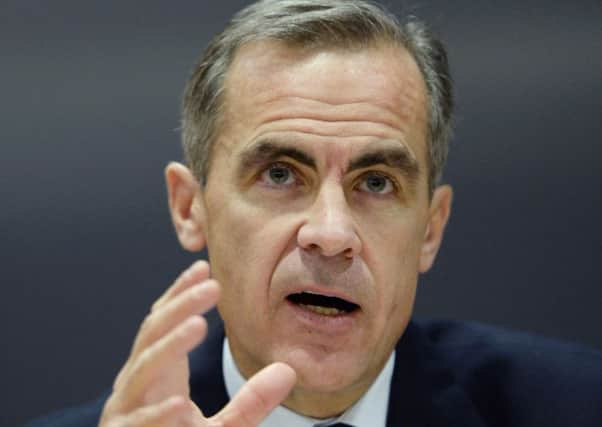Bank of England sees strong growth but ready to cut rates again if needed


Governor Mark Carney said he expected inflation to fall below zero in the coming months due to weak oil, but stressed that this by itself did not mean that the economy had entered deflation.
Inflation would hit the 2 per cent target in about two years’ time, the Bank said, sooner than it forecast three months ago.
Advertisement
Hide AdAdvertisement
Hide Ad“(It is) appropriate to return inflation to target as quickly as possible after the effects of energy and food prices movements have abated,” Mr Carney said.
Sterling rose against the dollar and government bond prices fell moderately after the quarterly Inflation Report, whose overall thrust was upbeat, with the economy close to being back to running at full capacity.
“The UK is not experiencing ‘deflation’,” Mr Carney said in a letter to Chancellor George Osborne explaining the difference between inflation - which stood at 0.5 per cent in its most recent reading - and the Bank’s 2 per cent target.
However, if global activity weakened and Britain became at risk of a vicious cycle of falling prices, the Bank said it was ready to cut rates, following in the footsteps of other central banks.
Advertisement
Hide AdAdvertisement
Hide AdThis is a major break from its previous position, where it had said this would be of little benefit, and that some lenders were too weak to cope with rates below 0.5 per cent.
“The MPC stands ready to take whatever action is needed, as events unfold, to ensure inflation remains likely to return to target in a timely fashion,” Mr Carney said.
The Bank raised its growth forecasts and predicted wages would grow faster, suggesting voters may feel some of the benefit of the recent economic rebound before Britain goes to the polls in May.
Average consumer price inflation in the second quarter of this year is likely to fall to a record-low annual rate of zero, the Bank forecast, lower than the 1 per cent it forecast in November.
Advertisement
Hide AdAdvertisement
Hide AdAfter that the Bank forecasts it will climb steadily to its 2 per cent target in two years if it raises interest rates as markets expect.
Financial markets do not expect the Bank to start to raise rates from their record-low 0.5 per cent until the third quarter of 2016.
The fact that the Bank forecasts inflation will marginally overshoot its target if interest rates do not rise until then suggests it may want to raise interest rates slightly earlier. Since the Bank calculated its forecasts, markets have already priced in a somewhat earlier move in early 2016.
The Bank also forecast that lower oil prices would boost growth next year compared with its November forecast.
Advertisement
Hide AdAdvertisement
Hide AdGrowth this year is forecast to be its strongest in several years at 2.9 per cent. For 2016, the Bank also expects growth of 2.9 per cent, up from November’s 2.6 per cent.
The benefits of growth may also start to be more widely felt, with wages forecast to grow by 3.5 per cent this year after rising by just 1.75 per cent in 2014.
Rain Newton-Smith, CBI director of economics, said: “While the risk of deflation is growing, it is unlikely that we will see falling prices for a prolonged period, as the pressure from lower oil prices unwinds ahead.
“Falling oil prices have knock-on benefits to the wider economy for companies and households, but the North Sea oil industry is being hit hard.
Advertisement
Hide AdAdvertisement
Hide Ad“As an immediate step, the Government should announce a commitment to reduce the supplementary charge in the Budget.”
The 30 per cent levy raised billions of pounds for the exchequer but is hitting oil fields already affected by the oil price collapse.
Ms Newton-Smith added: “With the Monetary Policy Committee alert to the risk of low inflation becoming entrenched, a rise in interest rates anytime soon seems off the cards.”
Howard Archer, chief UK and European economist at IHS Global Insight, said: “It is touch and go whether the Bank of England first hikes interest rates at the end of 2015 or waits until early 2016.”
Swedes shock markets
Advertisement
Hide AdAdvertisement
Hide AdSweden shocked financial markets today by introducing negative interest rates, launching bond purchases and saying it could take further steps to battle falling prices.
The central bank joins a list of those including the European Central Bank, the US Federal Reserve and the Bank of England, to resort to unconventional monetary policy steps to confront an unusual combination of economic problems.
Sweden’s economy is growing at a solid pace but even with that expansion, inflation is still way under the central bank’s 2 per cent target and some economists say Sweden risks a deflationary spiral.